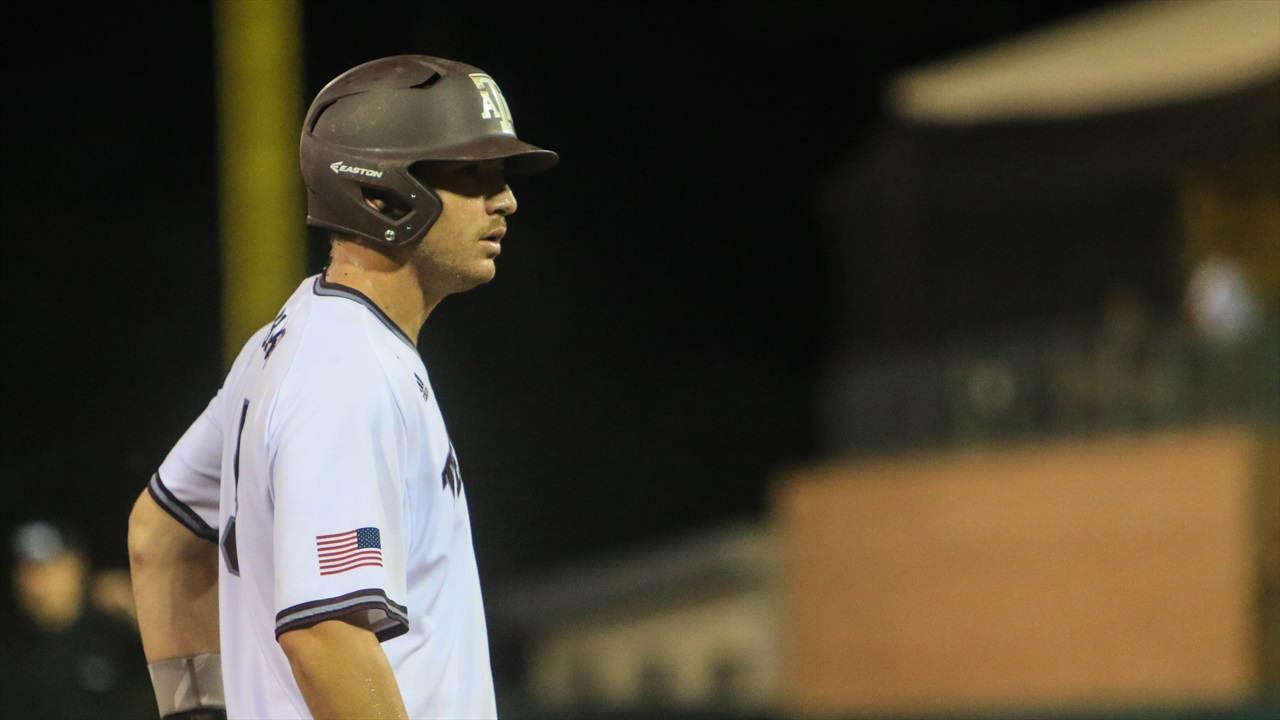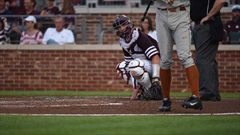
Dugout Chat: Former A&M catcher Michael Barash envisions long baseball career
The current trend in professional baseball is hiring former catchers as managers. Ten of the 32 MLB teams are currently led by catchers, including the last four World Series champions.
This is because the catcher is arguably the most important position on the field. He has to call the pitches, control the opposing team’s running game, guide the pitcher through each inning, and on top of all his defensive responsibilities, he also has to hit.
Michael Barash has epitomized the catcher position with his intelligence and leadership since the Aggies won 99 games with him behind the dish in his two seasons at Texas A&M, and as he has quickly moved up the professional ranks, he has only gotten better.
“I’ve always been a smart baseball player, and that’s what I take pride in,” Barash said in this week’s Dugout Chat. “Your physical talent can take you so far but what separates you from the next catcher or the next pitcher is what you think. For whatever reason, baseball IQ is something I was born with and blessed with and I thank God every day for it.”
Barash was fortunate enough to get drafted by the Angels, a team with a very catcher-friendly environment. When he was invited to Spring Training with the big-league club, he got to learn from a trio of highly regarded backstops.
Los Angeles manager Mike Scioscia caught for 13 years in the big leagues, catching coordinator Jose Molina was a defensive wizard behind the dish and won two World Series rings over the course of his 15-year career, and current Angels catcher Martin Maldanaldo won the 2017 Gold Glove for his defensive exploits.
“Hearing them talk about catching is kind of another level,” Barash said. “I wrote everything down. Whatever sticks out to me, I write down.”
Barash was exposed to an abundance of in-depth information, such as the importance of the 1-1 count in baseball, where the hitter’s OPS swings about 800 points based on the outcome of that one pitch.
And Barash, who has enjoyed thinking about baseball for as long as he remembers, tries to soak up as much of the knowledge as he can.
“He really works to maximize what he’s capable of doing,” said Texas A&M assistant coach Justin Seely. “He pays attention to everything that’s going on. He pays attention more than most guys do so he can get rewarded and he can reward the team. If he walks into a meeting with Mike Scioscia, he doesn’t just walk into the meeting and act like he’s paying attention — he walks in prepared to pay attention and you know Mike Scioscia notices that.”
Barash has also made strides offensively. He made some adjustments to his swing before his senior season at Texas A&M, and he has continued to evolve since then. He hit .241 with 10 home runs, 44 RBI and 19 doubles between High-A and Double-A in 2017, and he started tapping into his power potential after a meeting with Billy Eppler, the Angels general manager.

After Barash admitted to Eppler that he’s not a very fast runner, Eppler told him that night to try to hit the ball as high and as far as he could.
“That night I hit two homers, and for whatever reason that stuck with me,” Barash said. “If I hit the ball on the ground I’m probably out, so my mindset is to hit the ball to the big part of the field and homers will take care of themselves.”
Barash said the biggest difference between being a college student-athlete and a professional baseball player is the living situation. Once you get past Low-A in the Angels organization, the players are responsible for their own lodging, so Barash ended up living with six teammates in a two-bedroom, two-bathroom apartment.
It was a tight fit, but the cramped conditions offer motivation to minor leaguers to advance to the majors, where the living quarters are much more luxurious.
Said Barash: “What we say is if you don’t like it, play better.”
Barash is spending this offseason working out in College Station. After the season ended in early September, Barash took about three weeks off to let his body recharge. Then he started doing weight training and conditioning exercises. He didn’t pick up a bat and resume baseball activities until after Thanksgiving and does a lot of his hitting work with Nick Banks, now an outfielder in the Nationals organization, and A&M hitting coach Will Bolt.
“You play 140 games in 152 days, so what can you do to set yourself apart? Stay healthy, have those nagging injuries go away — that’s half the battle,” Barash said. “There was a span where we played 42 games in 43 days, and you just grind it out. A lot of the stuff is just physical. I know where I’m at mentally — I’m pretty stable there — but it’s just being consistent day in and day out.”
Barash also revealed what he wants to do after his playing days come to an end and, not surprisingly, his plans involve baseball.
“I know I want to coach at Texas A&M when it’s all said and done,” he said. “After a long big-league career, I want to come here and coach. I’ve seen the impact a college coach can have on a young man, and I want to do the same thing that they did for me to 27-to-35 other guys. If I can do that, it would make my life worthwhile.”
Seely said Barash is one of the most intelligent baseball players he’s ever coached and is a guy he thinks will make an excellent coach.
“That’s a guy we’ll figure out a job for — we’ll get a role for him for sure. He’s got what it takes,” Seely said. “I think he was a great college player, I think he’s got a shot to play in the big-leagues, and I think the things that are going to allow him to maximize his ability on the field are the things that are going to allow him to be a great coach. He’s great with people, he has ability but he works his tail off to maximize that ability, and he’s not afraid to get his hands dirty. He’s going to be a great baseball coach whether it’s professionally or here.”
But for now, Barash remains one hundred percent committed to getting his body in the best shape possible for when he reports to Spring Training in February.
“Once January hits I’ll start hitting and throwing every day. I do catching work every day with the machine to get my body back in baseball shape,” Barash said. “When I train it’s laser focus because it’s my career and the career is one phone call away. One phone call away is all it is."

